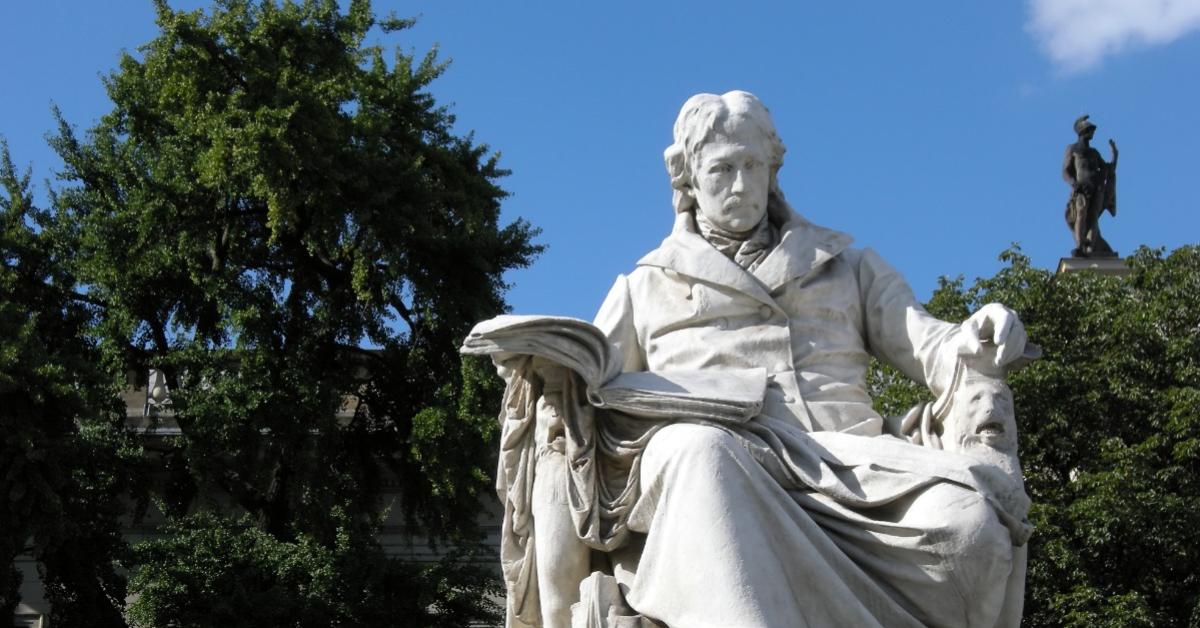Not many are aware that one of the greatest works against the encroachment of the state originates from a German thinker. As early as the late eighteenth century, Wilhelm von Humboldt (1767–1835) raised the question of the general limits of state activity. Humboldt wrote his Ideas for an Attempt to Determine the Limits of the Effectiveness of the State in 1792. While individual sections of it appeared in the Berlinische Monatsschrift, the complete text was published in 1851 through his estate.
Principle
According to Wilhelm von Humboldt, the basic principle of the limits of state activity lies in its strict necessity. Humboldt’s theoretical considerations lead to the general conclusion that state activity must not be subject to utility but to necessity. This “principle of necessity” is derived from the peculiarity of the natural human being in its individuality. Utility, in contrast to necessity, only exists in degrees and not as a fundamental principle. If one were to start from the principle of utility, it would be possible to continually justify ever more state intervention.
Determining the limits of state activity is not only about freedom in and of itself but also about benefiting from the diversity that is inherent in human beings. Freedom is closely connected to individuality—which is inconceivable without freedom—as the development of individuality presupposes freedom. On the other hand, privacy increases as much as the scope of state action decreases. Both are interrelated. Agreeing to the expansion of state activity means restricting the realm of private life.
The state can only focus on the results and establish the rules to be followed. This leads to the problem that when the state seeks to care for the positive well-being of its citizens, the measures taken necessarily must uniformly target a mixed multitude. From these considerations, Humboldt deduces the principle: “The state should refrain from all concern for the positive well-being of the citizens and go no further than necessary to secure their safety against themselves and external enemies; it should restrict their freedom for no other purpose.”
State Intervention
The goal of all education is to foster the development of personal individuality. Individual freedom and the diversity of the experience of life are the prerequisites for individual development. Therefore, in determining the limits of state activity, it follows that “every attempt by the state to interfere in the private affairs of citizens is reprehensible unless they have a direct bearing on the violation of one person’s rights by another person.” State intervention beyond the resolution of civil disputes is illegitimate. Rational reasoning restricts state activity to those actions that prevent harm when voluntary agreement cannot be reached within civil society itself. Even if state intervention seems to be justified in terms of its function, the arbitrary use of the means of state intervention cannot be allowed.
For Wilhelm von Humboldt, it is detrimental that the state tries to increase the positive well-being of the nation, whether through public welfare, the fostering of foreign trade, or the promotion of economic, monetary, and financial affairs. All these institutions and policy measures are inappropriate for a society based on a human perspective that claims individual development as its central value.
The state’s use of resources collides with the human pursuit of individual diversity. State intervention necessarily brings uniformity and thus is an action that is alien to private society. Uniform governmental interventions lead to a situation where, instead of individuals sharpening their own capabilities, the affected individuals obtain goods from the state at the expense of their own strength. Uniformity and weakness are the results of these interventions instead of the diversity and strength that emerge from the free interaction of people. The individuals affected by state intervention, even when these interventions are aimed at “supporting” them, are relegated to the role of objects. The superior power of the state hampers the spontaneous play of forces that thrive within the members of a free community: “Uniform causes have uniform effects. Therefore, the more the state participates, the more similar not only do the actions become, but also the effects produced.”
The state desires tranquility and obedience and therefore favors uniformity. In contrast, individuals desire diversity and sovereignty over their own activities. Only those who fail to recognize the essence of human life would assume that individuals are solely concerned with the accumulation of wealth and pleasure. Such a view denigrates human beings as machines.
The vitality of the individual comes to fruition when he can act for himself. Human pursuits are intimately connected to ownership and the freedom to act. In contrast, state interventions always weaken the individual’s abilities and thus weaken the nation. All strength presupposes enthusiasm, and few things nourish enthusiasm as much as individual possessions and the expectation of future property. The intellect and other human abilities are only developed through their own activity, personal invention, and the independent utilization of one’s own mind and own means: “State regulations, however, always entail more or less coercion, and even when this is not the case, they habituate people too much to expect more external instruction, guidance, and assistance than to think of solutions themselves.”
Not only does natural human activity suffer from state intervention but morality does as well. Those who are led by authority easily fall under the spell of voluntarily sacrificing the remainder of their own activity. The assisted individual believes that he is relieved of his own concerns through external help, and thus the concept of merit and guilt shifts. Due to the extended external help, such individuals tend to believe that they are not only exempt from any other duty beyond those that the state expressly imposes but also exempt from any necessity to improve their own conditions. Under state activity, not only does the strength of the individual suffer but so does the “goodness of the moral will.”
The more extensive the state’s activity, the more people will try to evade its laws and regulations, considering each escape as a gain. The more the state’s activity spreads, the colder the relationships between people become in society. Even in private social relationships, people will rely increasingly on the state. When everyone depends on the state’s assistance, voluntary mutual assistance will gradually weaken. What is not chosen freely by the individual, but in which he is restricted and guided, does not become a part of human nature. It remains forever alien to human beings, and people do not act with human power but behave with mechanical skill.
Necessity, Not Utility
Humboldt’s aim is to determine a principle for defining the limits of state activity. For this purpose, two aspects must be considered: firstly, what the government’s claim to authority should be based on, and secondly, what the scope of state activity should be and where its boundaries lie.
Humboldt’s considerations lead to the general conclusion that state activity is strictly subject to the principle of necessity and not to the criterion of utility. Utility would always require renewed action, while a necessity—as a strictly negative principle—demarcates the limits of state activity clearly. Justifying state activity based on utility drives more and more state intervention. Applying the criterion of utility to state activity does not allow for a pure and definite assessment. Applying the concept of utility requires calculations of probability, which cannot be error-free and are at risk of being thwarted by the slightest unforeseen circumstances. The gradations of utility are infinite. They always demand further action. On the other hand, necessity presents itself obviously, and what such a necessity commands is to be “always not only useful but even indispensable.”
The peculiarity of the natural human being determines the limits of the state, and only the principle of necessity is compatible with reverence for the individuality of self-active beings and the care for freedom that springs from this respect. Accordingly, the principle of necessity is “the only infallible means to empower laws and give them authority; they arise solely from this principle.” In contrast to necessity, utility provides no clear-cut demarcation. Applying the concept of utility to state activity means that there will always be different views and opinions to consider about what is useful and what is not as helpful. Justifying state activity based on utility brings with it more and more activities that are considered to fall within the realm of state activity, which by itself makes the justification in terms of utility increasingly questionable. Using utility as its guide, the study of a given situation becomes intricately complicated. This is quite different from the principle of necessity. By following the principle of necessity, the examination of the situation becomes simpler, and finding the right insight becomes easier.
Conclusion
A dynamic and powerful community requires that the state be as passive as possible. The philosophical ideal of the development of human individuality serves as the guiding principle in rejecting the active state. There is a trade-off in place that says that the more active the state, the more passive society will be and the less room there will be for human flourishing. An active state faces the contradiction that state interventions must inherently be uniform while the urge for diversity prevails in society.
As the main principle, Humboldt rejects utility in favor of necessity. Utility is a brittle and frail criterion that would allow any state expansion on dubious grounds. Necessity, in contrast, serves as the appropriate criterion. No state activity is legitimate that goes beyond necessity. The limit of state activity is strict necessity.



